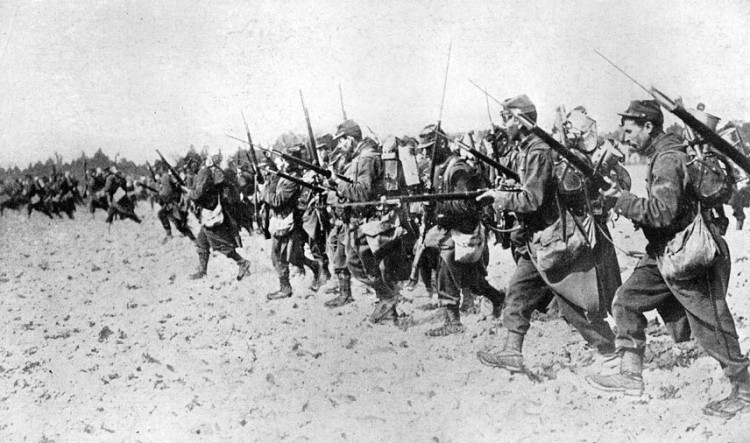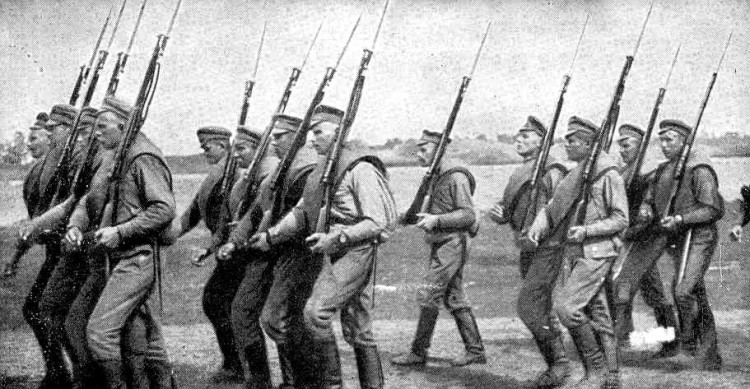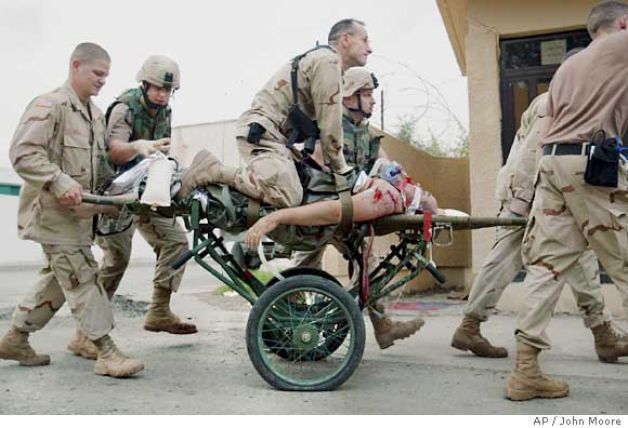 The theoreticians of the German Staff called it “the feel of the cloth”; this was their description of the tendency of men on the attack to close the distance between themselves so that they finally walked shoulder to shoulder towards the enemy position. German, French and Russian tactical directives called for men on the attack to keep a minimum distance of three yards between themselves. No bunching up.
The theoreticians of the German Staff called it “the feel of the cloth”; this was their description of the tendency of men on the attack to close the distance between themselves so that they finally walked shoulder to shoulder towards the enemy position. German, French and Russian tactical directives called for men on the attack to keep a minimum distance of three yards between themselves. No bunching up.
A French ‘Human Wave’ attack
Once the shells began falling, once the rifles opened up, they did not want the rush to be blunted by easy, mass casualties. When they sat at their desks and held their meetings, they had not taken the air cooled machine gun into consideration or the technological advances made in artillery. The men walking across the muddy plains, circling craters, and seeing the glint of the barbed wire understood, and like herd animals anywhere under threat, they sought out the solace of their brethren in their touch and in the comforting rasp of their breathing. According to Keegan, these charges resembled Napoleonic warfare — masses of men moving across open ground and by their weight attempting to take their objectives. Calvary in the tens of thousands swirled on the flanks.  Russian Infantry on the move
Russian Infantry on the move
On the Eastern Front in 1915, these human animals on the attack died by the hundreds of thousands in campaigns few in the West can even name: the battles of the Masurian Lakes; the battle of Tannenberg. Unlike the Western Front, no memoirs or poetry came out of these slaughters. Most of the Russian infantry were of peasant stock and illiterate. From the nation with the best University system in Europe, Germany produced very little literature from this theater of battle.*
From our perspective almost 100 years later, it is as if all those private souls just disappeared without making any impression upon life, as if they had always been merely the disembodied residue of the vast machinery of battalions, divisions, and armies. Instruments only or meat. Choose either metaphor.
I find my point-of-view changing. When I read military history now, I think constantly about the experience of the single men (and now the women) who endured the desperate absurdity of combat. I think about the schism between those who make it through combat and the rest of us. They belong to a different religion, one we can only understand on the peripheries as provided by literature. Finally, I think about those who call for war while remaining unscathed — especially those who have been safe all their fleshy, ambitious, wormy lives. Wilfred Owen called them, acidically, his “friend[s] who told with such high zest/ To children ardent for some desperate glory,/ The old Lie; Dulce et Decorum est/ Pro patria mori.”
We are shuffling in the dark towards another commitment of Marines and Army on the ground in Iraq.Is there anyone who can envision that ISIS will fight stand-up battles? If we go in, our soldiers will face IEDs again. They will not know whom to trust, again. The ‘rebels’ they will be asked to train will be infiltrated and in turn will unload their weapons into their teachers, again. The big transports will be ferrying their terrible loads into Dover Air Force Base, again.
Maybe the American Empire must do this or begin to lose its place. Maybe we are the “indispensable nation”, the only one with the hegemonic military reach and wealth to preserve Jordan, save the Yazidis and the Kurds, prop up a corrupt, sectarian Iraq because a vacuum would allow much worse characters such as ISIS to expand their influence. Maybe there is no one else with the capability to go after ISIS, a group that, based on its own propaganda videos, must be defeated on the battlefield, and one we would be foolish to ignore in terms of our own security concerns. Somebody is going to have to kill lots of them. They will not compromise. Not only does their ideology forbid it, but they are already so steeped in blood that they cannot go back.
So, let us say that all those maybes are true. An argument can be made for all of them … but when will anyone in power tell us what is real — that we should raise taxes to pay for the exertions of the Empire, that we should draft every 18 to 24 year old, male and female, to serve in the active protection of this country, that baby boomers will not be allowed to walk away this time; their social security benefits will need to be frozen or reduced so as to fund VA doctors and hospitals; that the one million members of the armed forces and their families will not, once more, have to bear alone the afflictions of wounds, death, PTSD cases, and wrecked lives, and that all of us, in it together, will pay the honest price for war.
 While we are at it, maybe it is time to consider a Constitutional Amendment that would stipulate that all members of Congress must have served or have children who are serving or have served. Let those werewolves who howl for blood know that blood of their own flesh might be spilled. If we are Rome (Roman Legion Bases, 80 A.D.), let the Emperors, Senators and Congressmen and women feel the sting of worry and know the direct fear of loss. Let photographers record the unloading of caskets in Dover, and let those photographs appear on every screen in this country.
While we are at it, maybe it is time to consider a Constitutional Amendment that would stipulate that all members of Congress must have served or have children who are serving or have served. Let those werewolves who howl for blood know that blood of their own flesh might be spilled. If we are Rome (Roman Legion Bases, 80 A.D.), let the Emperors, Senators and Congressmen and women feel the sting of worry and know the direct fear of loss. Let photographers record the unloading of caskets in Dover, and let those photographs appear on every screen in this country.
Trying to save a life in Fallujah, 2004
There is one essential reason we should take these steps. Forget owing anything to our children or posterity. Forget all the symbols of flag and anthem. We should do it because we have to begin to tell the truth to ourselves about who we are and about the cost of Empire. We must dispense with our corrupt innocence that tells us that we have no responsibilities, and that others can always do what is necessary. Only if we do this might we see our way clearly. Who knows, we might even acquire the attention span necessary to tell each other the truth about the degradation of the planet and about the rancid, money-engorged state of our politics.
When the Russians advanced to the front lines of the Masurian Lakes region of northeastern Poland, they walked through areas of great natural beauty. Some would have been entranced. At rest, they would have talked of their villages and their favorite foods. In the darkness of their trenches, pairs would have spoken to each other of their fears. In climbing out from behind their defenses and in their long walk toward the Germans, their senses would have been sharper than ever before in their lives — their adrenaline enhanced vision would have seen amazing, color-saturated images. Those who survived would have remembered. The dead should have been remembered by more than their families. They should always be remembered.
We live in a time when we must pay attention. We cannot be lulled into forgetfulness. The airstrikes into Syria began on Tuesday, the 23rd. Men and women in sunny, comfortable offices drinking hot coffee are making decisions that will change the lives of the men and women who walk into furnaces for a living. Their decisions will change our lives too. Therefore we must now remember those fighters of our own in Erbil, in fighter-bombers, in the Special Forces distributed across the region, and in their homes in the States anxiously anticipating a phone call.
Each of us must bear witness and think carefully about what we owe.
* Information Source: The First World War by John Keegan
Poignant and powerful, MIke.
War is hell, of course, but I often wonder if it isn’t the fate to which humans have always been destined. It’s a scary thought and not one my family takes lightly.
Our oldest girls are Army physicians and have seen the wrecked bodies and tortured souls of our soldiers returning home from the last 10 years of war. They have each been deployed to Afghanistan. In another year, thank God, they will put down their guns (yes, Army docs carry weapons, too) and pull off their uniforms. It will end for them then — hopefully — but, no, I don’t think war itself will ever end. We won’t let it. It’s in our DNA.
I agree that all the people in Washington, sitting behind their cushy desks, who make all the decisions to send our sons and daughters back into war should have been in one of our services. Let them see first hand what they are sending our forces into. My son is in his l7th year in the Marines and has been in Afghanistan, I just hope he and all the other “sons and “daughters” make it home safely.